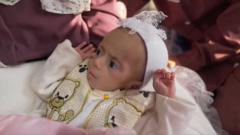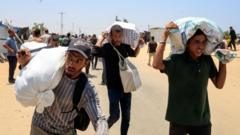The Kakuma refugee camp in Kenya faces an alarming crisis as US aid cuts force the UN's World Food Programme to reduce food rations, resulting in widespread malnutrition among children and families reliant on limited resources.
Humanitarian Crisis Deepens in Kenya's Kakuma Refugee Camp Amid Aid Reductions

Humanitarian Crisis Deepens in Kenya's Kakuma Refugee Camp Amid Aid Reductions
US funding cuts lead to severe malnutrition in Kakuma's refugee population, with families struggling against starvation.
Hundreds of thousands of refugees in Kenya are facing a burgeoning crisis of malnutrition and starvation, particularly in the sprawling Kakuma camp where recent cuts to US foreign aid have left families with meager food rations. The camp, which is home to around 300,000 individuals forced to flee conflict and instability in neighboring regions, is witnessing an increase in severely malnourished children filling the wards of the Amusait Hospital.
Doctors report cases of extreme malnutrition, as emaciated children receive treatment, with one infant, Hellen, displaying signs of life-threatening malnutrition. The rapidly dwindling supplies are exacerbated by cuts from the World Food Programme (WFP), which announced a reduction of food assistance to just 30% of the minimum daily nutritional needs since the US government slashed funding significantly—previously the country funded 70% of WFP’s operations in Kenya.
One mother, Agnes Awila from northern Uganda, expresses her despair as her eight-month-old son, James, receives only one meal a day, highlighting the desperate situation many face. Outside the food distribution center, refugees queue under unforgiving sun, receiving inadequate supplies while sharing stories of hunger.
Mukuniwa Bililo Mami, another mother of two, recalls better times when families received regular meals. With restrictions on aid, she struggles to feed her family and can no longer afford necessary medical supplies due to the cancellation of monthly cash transfers, which previously supported purchasing essentials.
Traders in the camp are equally affected, as diminished purchasing power has led to an increase in desperation among refugees, rendering local markets dysfunctional. Amid this dire context, many families only have a single meal a day, often waiting until the afternoon for nourishment.
Conditions at Amusait Hospital are sobering, with some infants requiring tube feeding, underscoring the escalating severity of malnutrition. As aid recovery prospects appear bleak, WFP’s head of operations in Kenya, Felix Okech, warns that the community is heading towards a widespread famine unless urgent support is secured.
The WFP is seeking further collaboration from international donors to restore essential aid, but with a 70% budget gap, hopes for a sustainable solution remain low. As the crisis unfolds, the plight of Kakuma's refugees serves as a stark reminder of the humane responsibilities that must prevail in the face of global geopolitical shifts.






















